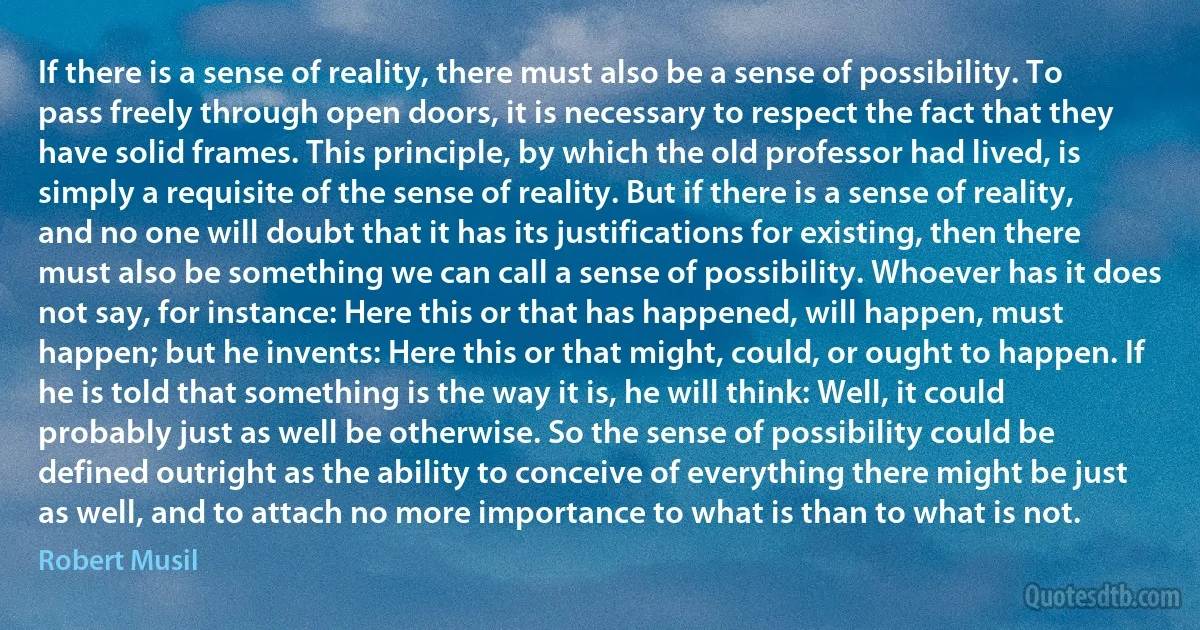
If there is a sense of reality, there must also be a sense of possibility. To pass freely through open doors, it is necessary to respect the fact that they have solid frames. This principle, by which the old professor had lived, is simply a requisite of the sense of reality. But if there is a sense of reality, and no one will doubt that it has its justifications for existing, then there must also be something we can call a sense of possibility. Whoever has it does not say, for instance: Here this or that has happened, will happen, must happen; but he invents: Here this or that might, could, or ought to happen. If he is told that something is the way it is, he will think: Well, it could probably just as well be otherwise. So the sense of possibility could be defined outright as the ability to conceive of everything there might be just as well, and to attach no more importance to what is than to what is not.
Robert MusilRelated topics
ability call doubt everything instance might necessary open ought pass possibility requisite respect say sense something tell think way well doorsRelated quotes
The evil of marriage, as is it practiced in the European countries, extends further than we have yet described. The method is for a thoughtless and romantic youth of each sex, to come together, to see each other, for a few times, and under circumstances full of delusion and then to vow eternal attachment. What is the consequence of this? In almost every instance they find themselves deceived. They are reduced to make the best of an irretrievable mistake. They are led to conceive it their wiser policy, to shut their eyes upon realities, happy, if by any perversion of intellect, they can persuade themselves that they were right in their first crude opinion of each other. Thus the institution of marriage is made a system of fraud; and men who carefully mislead their judgement in the daily affair of their life, must be expected to have a crippled judgement in every other concern.

William Godwin
Spinoza is a highly systematic thinker, but still I do not think I can offer a single key for all things Spinozistic. Personally, one thing which got me excited about Spinoza is his philosophical boldness, i. e., his willingness to pursue philosophical exploration as far as he can, making very little concessions to commonly accepted beliefs and norms. In terms of content, I take his attempt to conceive of God, nature, and ethics in a manner that is free from anthropomorphism and anthropocentric illusions as one of the deepest elements of his philosophical thinking. A closely related issue is his advocacy of actual infinity (an issue that has been mostly neglected in recent literature). Finally, the very attempt to do philosophy systematically (rather than rely on fragmented and disassociated intuitions) and transparently (laying bare the logical structure of his arguments) commands my respect, indeed admiration.

Baruch Spinoza
Literary criticism should arise out of a debt of love. In a manner evident and yet mysterious, the poem or the drama or the novel seizes upon our imaginings. We are not the same when we put down the work as we were when we took it up. To borrow an image from another domain: he who has truly apprehended a painting by Cézanne will thereafter see an apple or a chair as he had not seen them before. Great works of art pass through us like storm-winds, flinging open the doors of perception, pressing upon the architecture of our beliefs with their transforming powers. We seek to record their impact, to put our shaken house in its new order. Through some primary instinct of communion we seek to convey to others the quality and force of our experience. We would persuade them to lay themselves open to it. In this attempt at persuasion originate the truest insights criticism can afford.

George Steiner
If Germany is going again to be a great armed camp, filled with a population about twice as great as that of any State in Europe; and if she is going again to pursue a policy of world domination, it will no doubt tax all the statesmanship of the rest of the world to prevent a repetition of the calamities from which we have been suffering. But the only radical cure for this is a change in the international system of the world-a change which French statesmen are doing nothing to promote, and the very possibility of which many of them regard with ill-concealed derision. They may be right; but if they are, it is quite certain that no manipulation of the Rhine frontier is going to make France anything more than a second-rate Power, trembling at the nod of its great neighbours in the East, and depending from day to day on the changes and chances of a shifting diplomacy and uncertain alliances.

Arthur Balfour
In the Platonic dialectic, ... the terms "Being” "Non-being” "Movement,” "the One and the Many” "Identity” and "Contradiction” are methodically kept open, ambiguous, not fully defined. They have an open horizon, an entire universe of meaning which is gradually structured in the process of communication itself, but which is never closed. The propositions are submitted, developed, and tested in a dialogue, in which the partner is led to question the normally unquestioned universe of experience and speech, and to enter a new dimension of discourse - otherwise he is free and the discourse is addressed to his freedom. He is supposed to go beyond that which is given to him - as the speaker, in his proposition, goes beyond the initial setting of the terms. These terms have many meanings because the conditions to which they refer have many sides, implications, and effects which cannot be insulated and stabilized.

Herbert Marcuse
